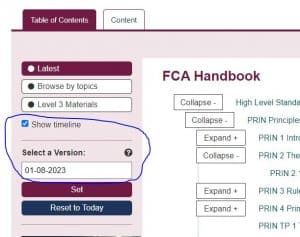Apologies for the Consumer Duty overload but unless you’re taking a regulatory sabbatical, this is very much a hot topic.
There are in excess of 50 FCA Handbooks (rules and guidance). You cannot be expected to be conversant with all of them, but you should have a good handle on the key ones, such as the various Conduct of Business handbooks. One that may not be at the forefront of your minds is PRIN: Principles for Business, but it really should be, because the FCA often highlights a failure of principle adherence when reviewing compliance standards.
Now, on 31 July 2023, the Consumer Duty rules start for all open products and services – pretty much for most of your business activity. At that time, the PRIN handbook changes:
- There is a new Principle 12: “A firm must act to deliver good outcomes for retail customers”.
- There is a new chapter PRIN 2A: The Consumer Duty.
Both the above can be viewed by forward dating the FCA Handbook as follows:

In general terms, Principle 12 and PRIN 2A impose a higher and more exacting standard of conduct in relation to a firm’s activities relative to what the current Principles 6 or 7 would have otherwise required.
Principle 12 and PRIN 2A also have a broader application in relation to a firm’s activities relative to Principles 6 and 7, with a greater focus on consumer protection outcomes for retail customers.
PRIN 2A has 11 sub-sections that very much reflect the guidance detailed in Finalised Guidance FG22/5 (non-Handbook Guidance for firms on the Consumer Duty).







Model behaviour
Alistair MacDougall Compliance Drawdown, EBI, FCA, ML, PI, Switch
The advent of Consumer Duty has catalysed a lot of focus on fair value, or at least a lot of chat. Anecdotal evidence would appear to suggest that many firms may not have made any material changes to their charging structures. However, a recent survey by Schroders gave rise to a headline in the financial […]